
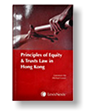
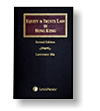
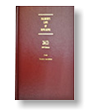
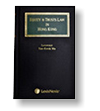

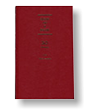
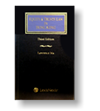
Equity and Trusts Law in Hong Kong 2006
Equity and Trusts Law in Hong Kong Second Edition 2009
Principles of Equity & Trusts Law in Hong Kong 2009
Halsbury's Law of HK Vol 26(2) Trusts & Voluntary Associations 2007
Principles of Equity & Trausts Law in Hong Kong Second Edition 2015
Halsbury's Law of HK Vol 26(2) Trusts & Voluntary Associations 2009
Equity and Trusts Law in Hong Kong Third Edition 2014
Preface to the Second Edition
Since the publication of the first edition of this text, there have been many important developments in the area of equity and trusts law, including Hong Kong and overseas case law, legislation (particularly the Trustees Ordinance Reform in Hong Kong) and academic commentaries. This second edition updates the first with excerpts and analyses of such new materials while preserving the student-frindly structure and style of the first edition, hopefully retaining its position as a concise and accessible introduction to the core principles of equity and trusts law set firmly within the Hong Kong context. A short summary of the most significant updates is provided below.
In English, the cases of Sinclair Investments (UK) v Versailles Trade Finance Ltd and FHR European Ventures v Cedar Capital Partners LLP [2011] WCA Civ 347, [2012] Ch 453 (Eng CA) concerned the proprietary nature of the constructive trust imposed against fiduciaries for accepting bribes and secret commissions, settling a long-standing controversy over this question.
Curtis v Pulbrook [2011] All ER (D) 62 introduced some clarity into the law on the constitution of trusts in the context of making gifts, re-interpreting the highly controversial decision in Pennington v Waine [2002] 4 All ER 215 (Eng CA) in line with orthodox English law principles of detrimental reliance.
The Hong Kong courts, meanwhile, have also produced significant judgments. Thanakham Kasikorn Thai Chamkat (Mahachon) v Akai HoldingsLtd (in lid) [2008] FKCU 810 (unreported, HCCL 59/2004, 26 May 2008) (CFI), a case on the unconscionability element in knowing receipt, held that 'irrationality' in the conduct of bank operations suffices to trigger the unconscionability threshold.
Re Estate of Mui Km Fong [2010] 4 HKLRD 69, [2010] 6 HKC 10, [2010] HKCU 1460 (CA) decided, amongst other points, the important issue of whether potential beneficiaries of a discretionary trust are entitled to be informed of their status.
Finally, a discussion of recent changes to trusts law in Hong Kong would not be complete without mentioning the Trustees Ordinance Reform. This second edition highlights the range of changes to Hong Kong's trusts regime, aimed at bringing the law in this jurisdiction more in line with international standards, made by the reform package which became law in 2013. Important changes include the right of the settlor to reserve powers of investment and asset management, the new power of beneficiaries with legal capacity to remove trustees, a statutory duty of care for professional trustees, and the abolishment of the rule against perpetuities.
The authors would like to thank Mr. Kevin Lau Cheuk Kei, an LLB and PCLL graduate of the University of Hong Kong for his assistance in the research on various topics of the text.
Lawrence Ma
Jeffrey Sham
July 2015

Copyright © 2016 by Lawrence Ma. All rights reserved.
You may reproduce materials available at this site for personal and educational use and for non-commercial distribution.
All copies must include the above copyright notice. The information you obtain at this site is not, nor is it intended to be, legal advice.
+852 3173 5511
ma@legalcounsel.com.hk
16C Neich Tower 128 Gloucester Road
Wanchai Hong Kong